The Machinery of Internet Censorship
The cyberwar has begun and business as usual just got uglier. The online community, like any new frontier, has its pioneers, its entrepreneurs, its communities and its outlaws. Businesses open shop for advertising, family and friends chat with each other through blog spots, forums and e-mail, gamers find their fellow addicts and information flows freely; or at least it had until recently.
In January of 2010, Australia made Internet history by introducing a censorship law, purportedly to protect the children from inappropriate language. The proposed system would operate by a mandatory monitoring and screening of all internet connections through ISPs in Australia, both public and private, and then routing blacklisted addresses through a secondary system. All routing from the blacklisted sites would be kept secret, and compiled using a public complaints mechanism, Government censors and URLs provided by international agencies.
While the decision didn’t gather any immediate endorsements, it did raise a great deal of debate as to what should be considered acceptable use of the Internet. Craig’s List, a popular site for advertising jobs, services, real estate, automobiles, and items was pressured into discontinuing an adults only portion of their listing when the opposition argued that the site was encouraging online prostitution.
Censorship didn’t remain long in the field as a tool for safe guarding material inappropriate for children. On December seventh, Julian Assange surrendered himself to authorities in London following sexual misconduct charges that allegedly took place between the dates of August 14th to August 18th of this year. The court has agreed to release him, after a second hearing, on £200,000 bail; over $350,000; for a double misdemeanor. Although his Wikileaks account has grown to £700,000 since October, his assets have remained frozen by the banks, with virtually no money for his accumulating legal defense.
Operation Intimidation and Brutality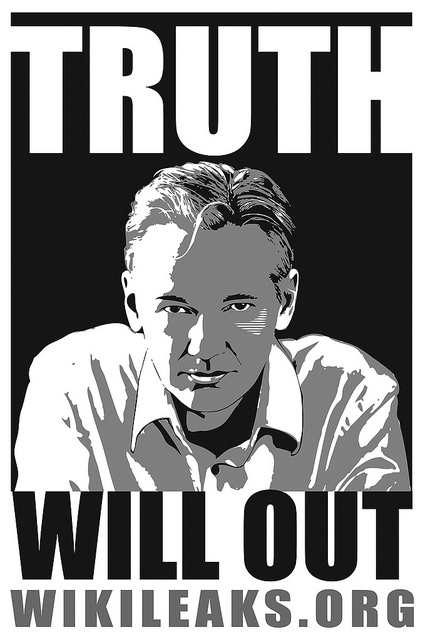
The gravity of the charges do not warrant the excessively high bail, the legal fees and the security measures to insure his extradition into Sweden. Viewing the judicial decision as selective prosecution, global citizenry have voiced a resounding protest. Asked whether Assange had any cash at all, his solicitor Jennifer Robinson said, “no. We have a huge amount of supporters [willing to donate money] but have nowhere to pay it.”
Assange’s legal team now includes Robinson, the media expert Mark Stephens, and the human rights lawyer Geoffrey Robertson, who successfully argued that Assange should be granted bail. A week ago their costs had already topped £60,000, sources suggest.
The real reason Assange has been seized by the judicial establishment is not because of failure to use a condom, but because certain powerful political figures, particularly those within the U.S. Government, want Wikileaks to stop publishing classified information. Their main concern is to punish Julian Assange for bringing to the public eye documents they’d rather leave secret. Sarah Palin’s reaction to this breach in freedom of press was, that the U.S. Government should “ hunt the Australian down with the same urgency we pursue al-Qaeda and Taliban leaders.” Assange has been purported to have said he would rather be extradited to Sweden or any other court at all rather than the black hole of the U.S. Government.
What, exactly, are the issues at stake? In May of 2010, Private First Class, Bradley Manning was arrested and charged with unauthorized use of classified information, after claiming in an Internet chat room that he was the one who leaked the now famous, “Collateral Murder” videotape of a helicopter air strike in Baghdad, July 12, 2007. Manning, who was an intelligence analyst, is reputed to have said that the tape first drew his attention, after viewing it as the attack had been made almost entirely on helpless civilians. He also claims that since that time, a video of the Granai airstrike and around 260,000 diplomatic cables were released to the whistleblower website Wikileaks.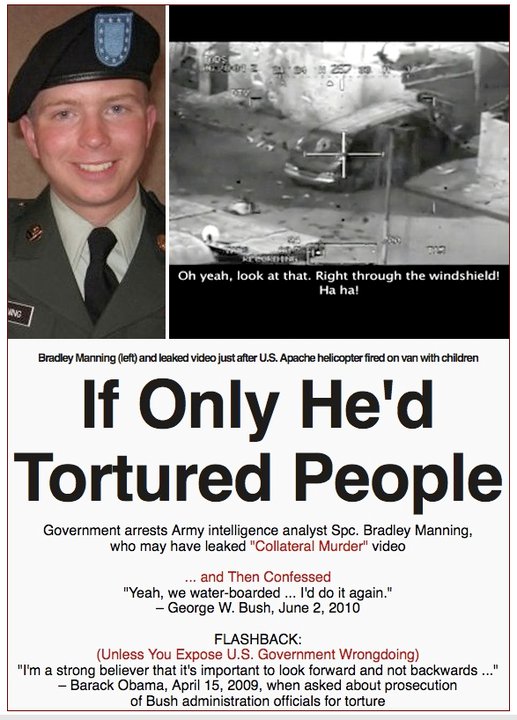
Following Manning’s arrest, Julian Assange immediately set up a defense fund, telling his alleged informant not to worry as, “[US] public statements have all been reasonable. But some statements made in private are a bit more questionable,” Assange told the Guardian in Brussels. “Politically it would be a great error for them to act. I feel perfectly safe … but I have been advised by my lawyers not to travel to the US during this period.” Of this date, Manning continues to be in jail without bond, under what has been described as cruel and inhumane treatment and, by the standards of many nations, even torture. Interviews with several people directly familiar with the conditions of Manning’s detention, ultimately including a Quantico brig official (Lt. Brian Villiard) who confirmed much of what they conveyed, establishes that the accused leaker is subjected to detention conditions likely to create long-term psychological injuries.
From the beginning of his detention, Manning has been held in intensive solitary confinement. For 23 out of 24 hours every day — for seven straight months and counting — he sits completely alone in his cell. Even inside his cell, his activities are heavily restricted; he’s barred even from exercising and is under constant surveillance to enforce those restrictions. For reasons that appear completely punitive, he’s being denied many of the most basic attributes of civilized imprisonment, including even a pillow or sheets for his bed (he is not and never has been on suicide watch). For the one hour per day when he is freed from this isolation, he is barred from accessing any news or current events programs. Lt. Villiard protested that the conditions are not “like jail movies where someone gets thrown into the hole,” but confirmed that he is in solitary confinement, entirely alone in his cell except for the one hour per day he is taken out.
According to Jeff Paterson, who runs the Bradley Manning legal defense fund, “We were aware of those situations and we were hoping that they would improve without applying public pressure through the media.”
Paterson says that Manning is “very annoyed” at the conditions of his confinement, adding that he is primarily upset at his inability to exercise. “He sits in this small box, for the most part only to take a shower – he just sits and eats and four months have gone by.”
According to Paterson, Manning has been examined by Quantico’s mental health officials, who declared that he is not a suicide risk – yet he continues to be held in solitary confinement due to a suicide watch. His overall mental health evaluation, which was begun in September, is still ongoing and should be wrapped up in a few weeks, says Paterson. Manning’s attorney, David Coombs did not return calls for comment. A spokesperson for the Pentagon did not return calls for comment.
Critics have condemned Wikileaks founder, Julian Assange, with not assisting Manning, but Paterson says $20,000 has been pledged from Wikileaks for his defense. However, he recently received a brief message from the Wau Holland Foundation in Germany, the main fundraising platform for WikiLeaks, stating that the foundation faces a possible audit by German authorities and that it cannot promise any funds at this time. As of last week, the defense fund had raised $95,000 from 1,350 people — Paterson said it is difficult to tell if any of those donations come from active members of the U.S. military.
Anonymously Fighting Back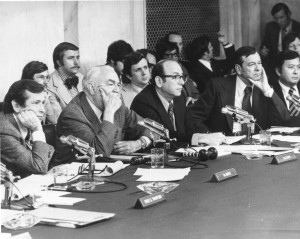
Whistle blowing is not a crime, and has been historically the means by which the press has been able to give objective, truthful coverage. The Watergate scandal, which was covered by two young reporters working for the Washington Post; Carl Bernstein and Bob Woodward, led to the arrest and conviction of five top GOP security aids working for the office of Richard Nixon, on charges of wire tapping and burglarizing the Democratic headquarters. Life magazine effectively whistle blew on the war in Vietnam when it brought, in glossy photographic images, the faces of the victims. It stunned the world by publishing the murder of a student protester at Kent State University by National Guardsmen.
The compiled evidence however, suggests that the U.S. Government wants whistle-blowing to become a thing of the past. Joseph Miller, who ran for the Alaskan Senate this year, lost all sympathy with his possible supporters when he detained and handcuffed a member of the press at a town meeting. His contention that what he plans to do is private, should he takes public office, continues to be a bit puzzling to a populace that is used to the assumption that policy should be clearly stated by their representatives, and influenced by the choices of the constituents.
The repercussions of Assange’s arrest have reached far and wide, but mainly through the efforts of a very youthful company who only call themselves “anonymous”. Following the arrest of Julian Assange, the loosely knit group launched a series of cyber attacks on the credit card companies that had frozen the Wikileaks account, including Master Charge, Pal Pal and Visa. The group flooded the company with Denial of Service attacks, causing as much as thirteen hour delays in completing transactions.
Police recently arrested two teenagers purportedly involved in contributing to the malware attacks on these credit card companies. According to an article at the website, “Naked Security”, a nineteen year old has been arrested in relation to the pro-WikiLeaks distributed denial-of-service attacks seen earlier this week.
The arrest of the 19-year-old youth follows Friday’s attacks on websites belonging to Dutch Police and national prosecutor’s office, which were themselves widely seen as retaliation against the apprehension the day before of a 16-year-old Dutch boy alleged to have participated in “Anonymous” pro-WikiLeaks attacks against a number of websites, including MasterCard and PayPal.
Is DDoS Protection Right for You?
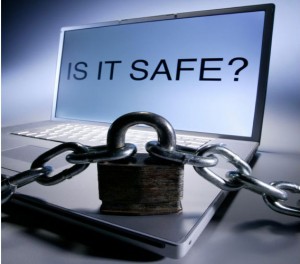 More alarming than the repercussions of the attacks, which the credit companies said had very little effect on their businesses, is the viewpoint taken concerning responsibility for personal computers. Security companies are advising owners of personal computers to secure their applications from accidentally sending out malware Denial of Service attacks. Acknowledging that any personal computer could contain the malicious software without the owner realizing it, they caution that ignorance might not be enough to safeguard against prosecution if it’s discovered your personal computer is part of a DDoS network.
More alarming than the repercussions of the attacks, which the credit companies said had very little effect on their businesses, is the viewpoint taken concerning responsibility for personal computers. Security companies are advising owners of personal computers to secure their applications from accidentally sending out malware Denial of Service attacks. Acknowledging that any personal computer could contain the malicious software without the owner realizing it, they caution that ignorance might not be enough to safeguard against prosecution if it’s discovered your personal computer is part of a DDoS network.
According to Mary Landesman, at About.Com, there is a lot of collateral damage to be collected behind the fallout of the DDoS attacks. She claims the Manning documents contained details about personal lives that could then be aired over the Internet, and that the release of Julian Assange and his access to the Wikileaks foundation could take down a bank or two.
In presenting her appraisal, she states, “the flash mob style participants in the DDoS attacks are likely predominantly a bunch of underage teens driven by the sort of quick impulsive reactions common to that age. Call them hactivists or vandals if you will, but the unfortunate side effect of an always-on Internet connection is that there is little barrier to action. And with little barrier to action, there’s precious little time to think things through and reconsider one’s actions.”
In conclusion, she states, “indeed, you might even be collateral damage without your realization. DDoS attackers frequently employ botnets to control bot-infected PCs in order to launch attacks against others. Now’s a good time to run a full system scan with up-to-date antivirus, before the authorities come knocking at your door.”
In reply, poster Tony Cowen states, “I’ve worked in the private sector for over 20.yrs as a CompTIA Certified Instructor & I can tell you one thing for certain.. I sat in on this little freak-fest called “Operation Payback.” & there’s something just not right about it.
It is laudable & even somewhat suspicious to believe any of these hardened mission critical systems, designed to handle millions of requests & simultaneously protect the servers from the outside influences of the internet were ever in any real danger.
If I were the senior administrator for either Visa, Master Card or Paypal & suddenly heard that these systems were crippled and defenseless for hours against the antiquated exploits of a simple TCP race-condition.?
There would have an instant reaction, with all the fury of a madman on parade.. any one and every one standing withing 50 feet of those server farm doors would have been fired immediately and with out prejudice.”
In the meantime, BlockDoS net services is offering their protection to businesses for $299 a month.
“We are Anonymous. We are Legion. We do not forgive. We do not forget. Expect us.”
Quote from an Anonymous website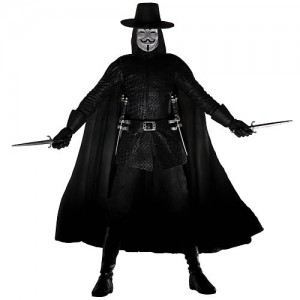
A web search into the group that calls itself The Anon Legion and takes responsibility for the DDoS malware, reveals a network of young; some quite talented and creative people; whose main interests seem to have been in the type of pranks teenagers are prone to pull and a lot of sexually oriented humor. They first came to media attention after a few enterprising members launched a series of cyber attacks against the Church of Scientology, claiming the organization was trying to suppress freedom of speech.
They appear to have two main heroes; the very real Wikileaks founder, Julian Assange, and the fictional DC comic book hero, “V for Vendetta”. Their avatar is the “V” mask, with the quote, “We are defenders of the internet. We are the keepers of truth. We are the army of one divided by zero. We are Anonymous. Join the Legion.”
As is the case in nearly all revolutions, it is the young people who have sounded the call to battle for freedom of press in the cyber war. While their actions may have been uncomfortable for their victims, they haven’t produced loss of limb or even serious cut-backs in the credit card or banking industry. What they have done, is bring attention to crucial issues that might otherwise have been swept under the rug or pushed quietly out the door. They’ve brought up questions on the legality of selectively prosecuting whistle blowers, the boundaries of what the public has the right to know, and that all essential freedom to express an opinion.
Most of all, they’ve exposed beyond a shadow of a doubt, how far political and corporate figures will go to silence their opposition. In the movie, “V”, the hero says, “a building is a symbol, as is the act of destroying it. Symbols are given power by people. A symbol, in and of itself is powerless, but with enough people behind it, blowing up a building can change the world.” The act of cyber attacking the leading credit card companies was a symbol, a symbol that can only be given power by the people. A symbol, in and of itself is powerless, but with enough people behind it, the messengers who instigated Denial of Service can change the world.
http://www.guardian.co.uk/media/2010/dec/15/court-costs-julian-assange-finances-strain
http://www.thenewnewinternet.com/2010/12/10/operation-payback-strikes-against-sarah-palin/
http://www.salon.com/news/opinion/glenn_greenwald/2010/12/14/manning
http://nakedsecurity.sophos.com/2010/12/12/second-dutch-arrest-wikileaks-ddos-attacks/
http://antivirus.about.com/b/2010/12/10/operation-payback-misguided-missiles.htm


[…] This post was mentioned on Twitter by NINETYTEN, Rick Todd. Rick Todd said: The Anon Legion Vendetta: They appear to have two main heroes; the very real Wikileaks founder, Julian Assange, … http://bit.ly/e8BZ8q […]
[…] influence whether …Assange breathes free air but rumours of US legal bid persistPolitics.co.ukThe Anon Legion VendettaSubversifyall 303 news […]
++Good
“In a time of universal deceit, speaking the truth is in itself a revolutionary act.” — Orwell
I’ve a feeling we’re going to get pretty cozy with those words – at least, those of us who Stayed Awake in Class.
We are entering a dark time, where it is no longer safe to sit on the fence.
We are going to have to pick a side. It’s time.
What a great article Karlsie! Lots of juicy tidbits there that should be disseminated so people can see just how corrupt these governments are. It doesn’t really matter whether you’re Democrat or Republican, liberal or conservative. If you think WikiLeaks should be shut down or Assange should be prosecuted then you’re a piece of Nazi shit. These same idiot TV commentators or magazine writers that call for Assange to be assassinated were living in Nazi Germany rooting on the holocaust. The same people who claim he should be prosecuted for national security reasons (or any other bullshit reason) were in Nazi Germany “just following orders.” Yeah, why bother publicizing the holocaust? It’s no one else’s business right? Why put people at risk? Why risk it? Don’t we owe allegiance to our country? Not if you’re doing something illegal.
My question is, if these people (politicians, journalists, government defenders) are so adamant about putting someone to death for speaking the truth and betraying their country….are these same people also willing to be tried in a life or death court case for spinning the truth and contributing to murderous propaganda?
I like your V for Vendetta analogy. The biggest threat to cases like this? Ordinary people not caring. Merchant services not caring. Maybe now you’ll take notice when you’re framed for terrorist activity or when your assets are suddenly frozen. Oh yes, Anonymous is a terrorist group. And I’m not saying it’s the “right thing” to do, to cyber-attack civilians. But terrorism is the natural consequence of a corrupt government…the consequences you call upon yourself for being a bastard in the first place.
The young warriors of today may be hiding behind a keyboard because of a lack of brains and social skills but they do have a rebellious, fearless streak just the same. It’s no wonder the world has provoked them…they took away the one, lonely thing Generation Y had going for itself….freedom of speech on the Internet. A virtual wasteland of history and commentary, the human right to congregate, to right to speak off the record and on your private PC.
The very idea of the government violating that sacred trust is just appalling. Shame on the Obama administration for learning NOTHING from Bush’s hypocrisy.
Will, i’m sure you remember the little exercise i gave our writers when we first began putting this magazine together. I asked them to define their spiritual; as opposed to religious; beliefs. While some floundered over defining spiritual, i had a singular focus. I suspected then that the general trend was moving away from a live and let live attitude, and toward legal guidelines that would restrict free movement and penalize or condemn specific behaviors and cultural/ ethnic groups. I wanted to know how strong each moral compass was because i felt and continue to feel what is legal will not always be lawful, and that there will be many times the right choice will not be the legal choice. Our convictions will be tested, again and again.
Mitch, i agree. Those who would cover the truth or cannot bear to look at the truth are Nazi’s. Those who sit quietly by and do nothing to protest the injustices being committed by the US Government, are accomplices to the Nazi’s. They are as guilty as the citizens who did nothing when their neighbors were robbed of their homes and livelihoods, thrown into prisons than gas chambers, because they were Jews.
I was impressed with some of the more informative sites of the anon legion. These kids are on the ball. While i suspect some simply like the radical aspect of making penis jokes, i saw in others a driving need to expose injustices. I don’t think they are going to be a do nothing generation. I see them moving in a clear direction, one that suggests they want to take control over their future.
The future is in their hands. We should be supportive. A cyber war is far less painful than a physical battle. Their attack was a deliberate calculation to bring attention to the demise of Julian Assange and for the illegal incarceration of Bradley Manning. Their strategy was good and accomplished more than three days of rioting in London could have done.
[Quote=The Late Mitchell Warren]Oh yes, Anonymous is a terrorist group. And I’m not saying it’s the “right thing” to do, to cyber-attack civilians. But terrorism is the natural consequence of a corrupt government…the consequences you call upon yourself for being a bastard in the first place. [/quote]
“Terrorism” is an illusion – there is no such thing as “terrorism” or “terrorists” until a social establishment defines the idea into being. Also, the notions of “right” and “wrong” are also social constructs: they don’t exist until society defines them.
With that in mind, these guys at Anonymous are only “terrorists” so long as the government says they are – meanwhile politicians that enact polcies that kill and surpress millions evey year are not “terrorists” because society does not designate them as such. Furthermore, the attacks on corporate infrastructure is “wrong” because the “law” deems it such: but the lethal policies previously mentioned are “right” simply because they are the “law.”
Personally, I grow tiered of discussing events in terms of “right” and “wrong” or attempting to discern who the “terrorist” is – I’d prefer that people just admit that the established order does not have their interests at heart yet demand total compliance. In other words, any power that demands obedience and gives nothing in return does not give a flying fuck about you: therefore, if you are smart and think about yourself and yours first (which is natural), you will support (or at least offer no opposition to) those who fight against that power that seeks to control and enslave you – “terrorist” status be damned.
Christopher, I was going by the literal definition of terrorist: a radical who employs terror as a political weapon; usually organizes with other terrorists in small cells. A group of dissidents opposed against a mainstream group, such as a country, and who uses fear tactics to get notice. A government like the US may well use terrorist tactics…but since they are the majority power, I wouldn’t call them a “radical” or a factionary group of terrorists. As far as morality goes, there is no right and wrong here. Terrorist groups think they are doing God’s work, the government thinks it’s promoting its own values. In the end, both sides hurt innocent people making them bloodguilty…if not “evil.”
Of course, one then has to define bloodguilt…and according to the rule of the animal kingdom, it’s survival of the fittest so the point is moot.
I guess the only question puzzling me at the moment is what’s the difference between a terrorist attack and a revolution? As I understand it…the difference is that a revolution is organized and a terrorist attack is just random, disorganized noise.
I generally think of a terrorist as anyone who strikes terror at another; whether an individual or group; if the purpose is to strike fear, than the act was one of terrorism. The Anon Legion didn’t strike fear. At the most, it created a vexation and annoyance to its intended victims. The US may wish to label them terrorists, but their own aggressiveness toward opposition; foreign and domestic; is far more terrorizing.
Revolutions do not always involve bloodshed. They entail the agreement of a large body of people to try something different. The industrial age was called the industrial revolution; new ideas, radical overhauls in education, business or policies are revolutionary. Social revolutions often dissolve into bloodshed when the opposition uses terrorist methods to abort them. It then becomes a chess game; terror for terror, tit for tat.
A terrorist would have kidnapped a high official and tortured him or her in the same manner that Bradley Manning is being tortured. A revolutionary will attempt the most persuasive means available before resorting to violence; which is the reason so many writers are called revolutionary writers. They hope to persuade through the powers of reason. A revolutionary often has only the intent to defend his or her ideals, family and community against terrorist attacks on their well being.
While we’re on the subject of definitions, i’d like to squabble over the use of “legal” and “lawful”. Lawful is the common agreement that comes from centuries of civilizations learning how best to maintain a harmonious community. Thus, laws such as theft, murder, intentional damage to your neighbor are considered common law jurisdiction. What is legal, however, is not always lawful. It’s legal for the department of transportation to take a portion of a citizen’s lawfully acquired property in the interest of eminent domain. It’s legal to arrest, detain, confiscate the belongings of a person suspected of selling illicit drugs but it’s not illegal for pharmaceutical companies to sell them. It’s legal to coerce people into contractual agreements, such as for insurance, education and a host of licensed applications, but it’s not necessarily lawful. Lawful is the agreed upon means people use to live together. Legal is the transactional agreement between businesses and governments. For trade and commerce, these legal documents are necessary for the smooth transference of goods, resources and labor. However, when the legalities are no longer beneficial for the citizens; when they in fact, step out of the boundaries of lawful conduct; then legalities are no longer a valid point.
I share the view of “terrorism” that Glen Greenwald has – that the term is little more than a means for the establishment to demonize violence that does not work to its benefit, meanwhile providing a platform with which to justify its own violence in the eyes of the common people (see his presentation here: http://vimeo.com/16494687 ). Because the term is so sporadically applied to anything that the establishment considers violent, the term is essentially meaningless.
Christopher, i clicked into the full article; i’m a glutton for research punishment. I found Greenwald’s words pretty agreeable; especially, quote; “The term terrorism…is being used to…erode and degrade and ultimately demolish this term…that was really intended to be crystal clear, which is civil liberties,” This is pretty much how i felt about the word terrorist as soon as it became a redundant part of the English language. Focusing on the definition, “a terrorist is anyone who strikes terror in me”, i rationed that Muslims, people of color, the homeless, the desperate, the hungry poor do not terrorize me. Even the drug cartels, the Mafia, the unidentified underground do not terrorize me. They live by the own laws. If you choose to step into their world, you choose to abide by them or face the consequences of violating them. What terrorizes me is the brutality of a government that breaks humanitarian laws, then hides behind legal shields of their own making. Their terror is in being brought for judgment by the masses.
While I feel terror itself can be very real and employed to control, I do agree with Christopher. Terrorism is only a word and it only works if people are terrified. To that end, our own country terrifies us on a daily basis with threat levels, pat downs and scanners. Not to mention everyday news, speeches and laws.
Ending terrorism is pretty simple, cease to be afraid. For that you need to put your house in order.
But Anonymous I would not call a Terrorist group, nor would I say they have a “lack of brains or social skills” I think in fact they are simply very new at this and still working into what may become surprising. Also they are not strictly political. Although they did send letters to the Austrailian PM and others over censorship. They also attacked the Church of Scientology over their mistreatment and brainwashing and killing of youth in their centres of learning. That was in no way political. But it does point to maybe where some people involved come from.
Great piece, Karla. Let’s consider another form of net terrorism: the horrible decision recently by the FCC in the U.S. to kinda/ sorta “protect” net neutrality. It’s censorship by any other name, as your article clearly articulates.
If parts of our government and military are as backwards as we see in WikiLeaks, then I have NO problem with that being made public. If you don’t want dodgy actions to be brought to the public’s attention, then don’t do them in the first place.
[…] Charge, Pay Pal and Visa. The responsibility for the attacks was connected to a group called “Anonymous”, protesting the freezing of Wikileaks leader, Julian Assange’s assets following his arrest for […]
Good write up, cheers for taking the time.
Extra Reading…
[…]we like to honor other sites on the web, even if they aren’t related to us, by linking to them. Below are some sites worth checking out[…]…